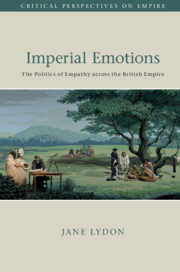Book contents
- Imperial Emotions
- Critical Perspectives on Empire
- Imperial Emotions
- Copyright page
- Dedication
- Contents
- Figures
- Acknowledgements
- Introduction: Emotions and Empire
- 1 Children of Empire: British Nationalism and Colonial Utopias
- 2 Colonial ‘Blind Spots’: Images of Frontier Conflict
- 3 Australian Uncle Tom’s Cabins
- 4 The Homeless of Empire: Imperial Outcasts in Bleak House
- 5 Christian Heroes on the New Frontier
- 6 Charity Begins at Home: Philanthropy, Magic Lantern Slides and Missionary Performances
- 7 The Republican Debate and Popular Royalism: ‘a Strange Reluctance to Actually Shout at the Queen’
- Bibliography
- Index
5 - Christian Heroes on the New Frontier
Published online by Cambridge University Press: 30 September 2019
- Imperial Emotions
- Critical Perspectives on Empire
- Imperial Emotions
- Copyright page
- Dedication
- Contents
- Figures
- Acknowledgements
- Introduction: Emotions and Empire
- 1 Children of Empire: British Nationalism and Colonial Utopias
- 2 Colonial ‘Blind Spots’: Images of Frontier Conflict
- 3 Australian Uncle Tom’s Cabins
- 4 The Homeless of Empire: Imperial Outcasts in Bleak House
- 5 Christian Heroes on the New Frontier
- 6 Charity Begins at Home: Philanthropy, Magic Lantern Slides and Missionary Performances
- 7 The Republican Debate and Popular Royalism: ‘a Strange Reluctance to Actually Shout at the Queen’
- Bibliography
- Index
Summary
Violent conflict between white settlers and Aboriginal people had ceased across most of the continent, but north-western Western Australia continued to witness clashes, brutal labour practices and sexual exploitation. In 1885, the missionary John Brown Gribble, fresh from a visit to London’s Exeter Hall circle, attempted to establish a mission in the Gascoyne River region. He quickly antagonised the region’s pastoralist interests and a press scandal eventuated, in which the pastoralist lobby sought to ridicule Gribble’s claims for sympathy toward Aboriginal people, and assert their own. Gribble aspired to what is often termed ‘muscular Christianity’, a form of masculinity that linked spiritual belief to more secular values of bravery and heroism, and his hero was African abolitionist and missionary David Livingstone. British anti-slavery sentiment framed Gribble’s notorious 1886 denunciation, Dark Deeds in a Sunny Land. Yet the colonial public was sceptical regarding what many considered sensational and excessive. Gribble’s writing is typical of narratives of Christian heroism within a religious literary tradition of persecution, self-sacrifice and redemption that were ultimately modelled upon the life of Jesus Christ himself.
Keywords
- Type
- Chapter
- Information
- Imperial EmotionsThe Politics of Empathy across the British Empire, pp. 123 - 142Publisher: Cambridge University PressPrint publication year: 2019



